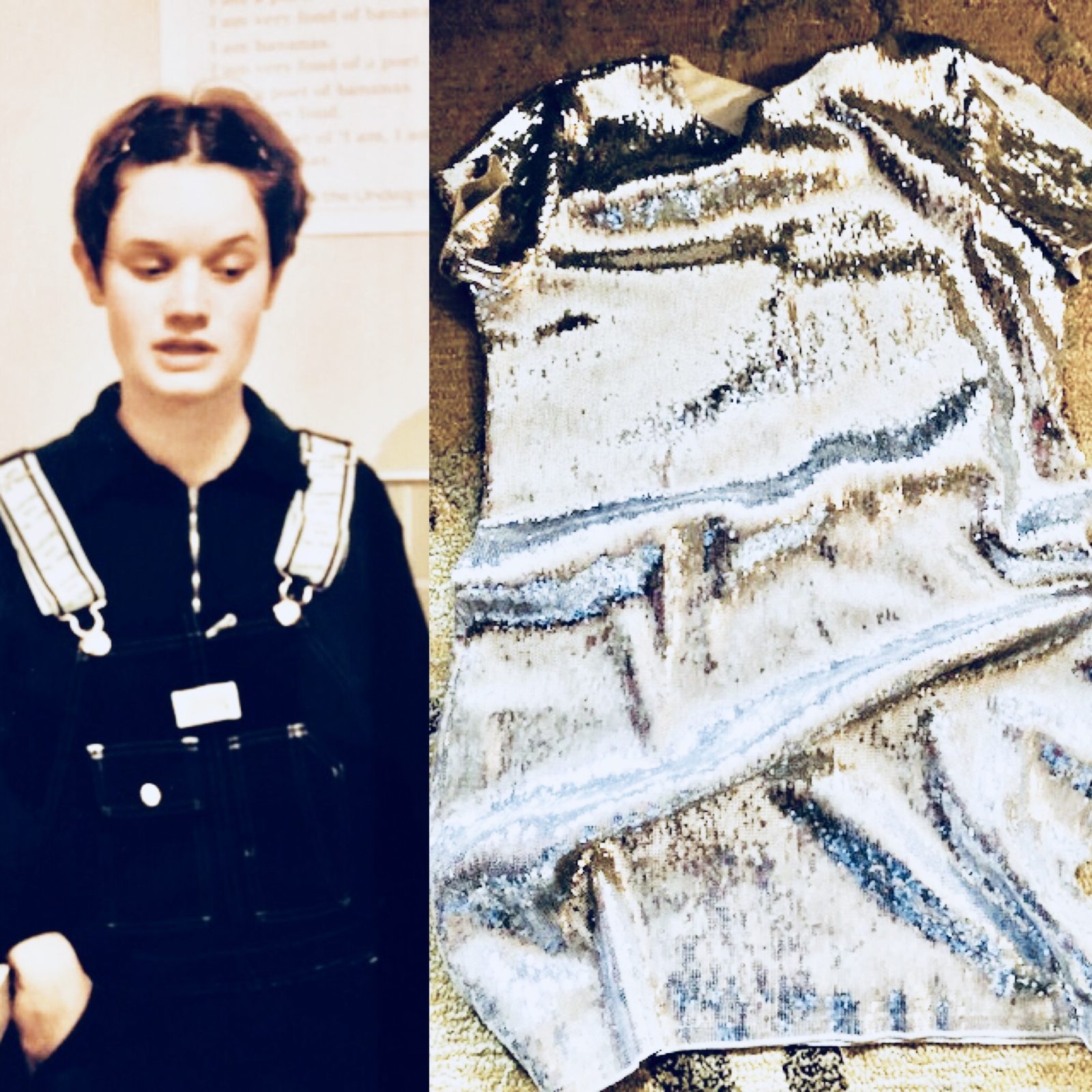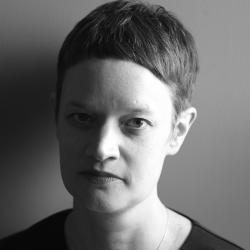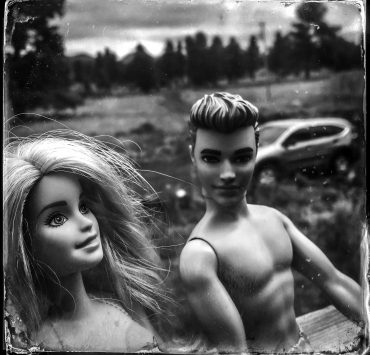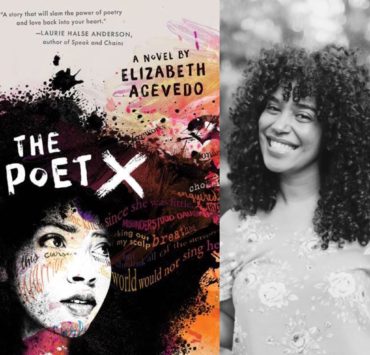
1.
When I was sixteen, my best friend and I found a bolt of bright, mustard yellow, polyester fabric in the clearance bin at Joanne Fabrics. We wanted to make wide-legged high-waisted pants—like I now see when I scan the racks at Top Shop—and long hip-hugging skirts. Neither of us had mastered zippers, but we were fine with an elasticized waistband. But it was the color that really got us. Nobody in our dying Rust Belt town wore this color. It was obnoxious and loud, not to be missed against the gray, dirt snow. We bought the whole bolt for maybe five bucks.
The fabric was so thick it jammed our sewing machines, but we re-threaded the needles and made two hideous pairs of big-legged pants. The waistbands were bunchy and uncomfortable because the elastic was big and also from the clearance bin. No matter. We loved them and wore them to school. Our few punk friends marveled at our DIY skills, while we withstood the usual attacks from football players and cheerleaders. Whispers and looks. Not like the beatings our male friends endured. The pants were uncomfortably hot because they were made of tires and plastics or whatever stew of pesticides and polymers made up 80s polyesters. If there were a fire, we’d have been burned alive by our pants. One of us may have gotten a yeast infection from wearing them. We were living a fantasy version of ourselves. We needed to believe we could make something out of nothing. That the ugly could become noteworthy and that we could turn garbage into couture. We didn’t follow style rules. We made our own. We wanted to feel yellow—bright, futuristic, loud, while our town regularly told us that we were dirt.
One of the many brilliant threads in Andrea Lawlor’s new novel, Paul Takes the Form of a Mortal Girl, is around the rituals of clothing—their power, their possibility for subversion, their ability to transform us, and the way they situate and complicate our genders. Paul, who has a kind of superpower, and can transform his body into a woman’s body (with a spongy vagina) and sometimes a more masculine male body (with a bigger penis), has a talent for clothing and fantasy among other less bankable skills. In the middle of the novel, Paul moves to San Francisco to recover from a break-up in Provincetown, where he lived as Polly for several months. The narrator admits:
Paul had to have a job. But maybe not drag. He walked and listed his other known talents: pouring beer without too much head, shoplifting, washing dishes, organizing items, knowing what was going to fashionable a little bit early, thrifting, clever commentary, introducing people to other people, cutting pictures out of magazines with x-acto knives, knowing when people where open to having sex, having sex, being gay. (227)
I still count some of these things as my talents, and still one has to have a job. Sigh. I don’t want to give too much of the novel away, but Lawlor is so deft at recreating that early nineties, Generation X, slacker, queer, state school milieu, that I fell nostalgically back into the time where I spent hours pulling together an outfit for a party, took the campus bus everywhere, and held several different jobs while trying to cobble together my $150 a month rent. And yet the novel is futuristic and almost sci-fi in its ideas about gender—as mutable, as ever changing, and a physicality we can mostly control at will with our minds.
2.
My dad’s favorite movie is Blade Runner. I like to joke with my therapist that I’m a replicant, your basic pleasure model. I find this comforting, and my neurological disorder often leaves me with joint pain that makes me feel robotic and spastic. My father raised my brother and I to believe we were part of a special tribe, that there is nobody else like us. Misunderstood smarties. Robots. Replicants. Aliens to our own planet.
To be raised by a narcissist father is to learn quickly how to mirror and please. My father has always liked me best when I am staring into his face, nodding along with his story, and not saying a word. Growing up, he liked to play full albums for my brother and I while we sat trapped on the couch. Sometimes they were amazing—my father introduced me to Prince, R.E.M., Steely Dan, The Pretenders, The Talking Heads, and Z.Z. Top. There was also Molly Hatchett, A.C.D.C, and Metallica. Once, while a born-again Christian family improbably ate dinner at our atheist table, my father insisted on playing “Darling Nicki.”
The mother of that family, whose daughter had shunned me at a Christian sleepaway camp I attended in a lame middle-school attempt to try new things, turned to me, with a sweetly evil smile and said, “Do you like this song?”
“I love Prince,”I might have said while my mother yelled, “They hate it. Turn it off!”
We were having one of our torture dinners. No matter the guests or if it was just us, we couldn’t get along. My father, genuinely believed he could convert these bland white Christians into liking Prince. He thought if they could just listen, really listen, they’d get it. It was always like that with him. Pay attention. Stick with me. It will all make sense.
When my ex-husband and I separated, my father lamented, “But how will I see him?” A couple weeks later he accused me of “being gay and ruining my marriage.” A couple months later, I decided to stop talking to him.
Oh shut up Dad, I wanted to say to him, There are so many ways to ruin a marriage.
3.
Earlier in Paul Takes the Form of a Mortal Girl, Paul as Polly sits in a cafe with their girlfriend Diane in Provincetown. Diane wants to help set free an abused dog and is annoyed with Polly for lacking focus:
Paul looked down at his burgundy cords, his black Runways tee shirt (a church thrift shop score in Orleans—how jealous would Jane be) tight over his waffled long-john shirt, his Save the Whales! belt buckle with its fresco humpback. He liked this new look, enjoyed this foray into androgynous style, liked the little fuck-you shadows of femininity he deployed. He wasn’t trying to copy Diane, but he did like them to be complementary. He did manage to find a copy of Times Square at City Video and rented it for them to watch together, had tried to explain to her his thoughts on runaway tomboy rocker dyke gender, but she’d been unimpressed. Diane didn’t like to talk about gayness very often. Paul estimated that he held back two out of five gay-themed comments. (201)
Androgynous style. The little fuck you shadows of femininity. Deployment and subterfuge. Hiding in plain sight. I’ve long used clothing to confuse myself, to confuse others, to register as unreadable or misplaced. I’ve been happiest at 21 and now in my mid-forties with short boyish hair. Baggy boyish clothes delight me, but I’m often in dresses that are technically inappropriate for the occasion. I sometimes teach in a silver sequined dress because it cheers me up. I wear yoga pants everywhere. I use a jean jacket as a suit coat. I wear bikinis to show my stretch marks. I hate seeing fellow moms in beach dresses, though I totally get the desire to cover up. The truth is, I don’t often see myself. Can we ever really see ourselves from the outside? Our asses especially? The backs of our necks? There is the image we think we give off and something far more complicated that gets transmitted to the world.
There was that leather/pleather leaf print tie-dyed jacket I bought in Albany with Janna. A neon green and black mini-skirt from Betsy Johnson, a $15 Century 21 score. A mint green lozenge of a dress, stitched on a machine like my mother used to make us matching yellow lace wedding dresses. Those purple and black combat boots, faux Fluevog. I wore those to book Writing Center appointments, meet drunks at Sophie’s and Mars Bars, and to lie across laps in the backseats of cabs. The TJ Max bras I buy with Stef and the drawstring skirt my daughter and I stitched for Genevieve the rabbit.
When I used the gender conversion app on Facebook, the only thing it adds is stubble. I feel this is another hint for me, that I’m circling something I need to figure out.
“But you only write about your relationships with men,” my friend is pushing me at a bar. She’s femme, identifies as a lesbian, and is a truth teller. I take it in because listening is something I can do.
“That’s true,” I admit. “This is new to me. I haven’t been in a relationship with a woman. I make out with them, I’m attracted to them, but I want to do more, and I need to write about it.”
There is more to this conversation. Another good friend is there too. We are talking about openness, tenderness, risks, and dogs.
We are talking about a woman I met two weeks ago at a poetry reading. We wandered around together with a small crowd afterwards. She stayed close to me, said things like, You know where to go.
Everyone left. We had the dim divey back room of the bar to ourselves. We were magnetized. Mouths. Lips. Hands. I slid my hands under her shirt, rubbed at her jeans. She put her hands down my pants. I was wearing period underwear, which is like a chastity belt. I felt an ideological wall falling down. I am a Gemini and we can be sloppy with our love. I had some tequila. What is gender? What is a dick or a man anyway? My whole life I’ve been taking care of dicks, petting, sucking, rubbing them and maybe I don’t have to all of the time? Maybe it’s not about gender at all, but people, a person. I sound like I haven’t read any theory on anything, but I’ve read it all. I should quote Butler, Sedgewick, Preciado, or Halberstam, but I’m not feeling it. I’ve got Lawlor. They are my theory. The novel is theory at its most embodied form I think. I’m not a person who “hates labels,” and I’m not trying to be dodgy. I’m confused sometimes. I hate binaries. I am often two or three things at once. I’m queer. Bisexual. There I wrote it. If anything I think too much, and suffer from deep earnestness.
We stumbled out of that bar. We ate pizza and stared out the window at the stupid, gentrifying East Village. We kept touching each other. We talked about another woman we both have a crush on, a mutual friend who confused us. I told her about my boyfriend. She told me about her wife. We love them both very much. We talked about our rules for openness. We didn’t improbably go home together.
4.
There’s something very silly about coming out at 45. I mean, like, who cares? I find myself back in my state school town, like Paul in Lawlor’s novel, feeling nostalgic for all my gay best boyfriends and their coming out to me. My response was often, “I know and it’s great and I love you.” But I shouldn’t have said “I know,” because it takes away the drama of it, the declaration, the announcement that felt so important in the 90s and maybe still does.
I tell my mother on the phone and she says, “I’m not surprised.”
“How come?” I ask.
“Because you like to go to Long Island with S and D,” as if traveling with a queer couple means anything in particular.
“And you can’t live here.” She’s referring to the dying gray dirt town I left but where everyone in my family still lives. My dear mom, who is always looking for reasons to explain why I left her, why I had to move away to the big city and live such a precarious life.
“But mom,” I tease, “That’s not why I can’t live there. I mean I feel like a big dyke when I’m home. I don’t look like anyone else, they stare. It’s bad there. There are no jobs there for me, no thing I can do. It’s so small, I’d suffocate.”
“Everybody stares here,” she’s been saying this to me my whole life. In my teens and twenties, it drove me crazy. It felt like an excuse, a cop out. But now I find it cute. My mom is 70. Like most of the women in her family, she is improbably healthy. Tough. Fit. Totally with it mentally.
I don’t want anything to happen to her. I want us to know each other as fully as possible. We’ve come a long way in our relationship.
“It’s okay,” she says.
“I know.”
And then she starts telling me about the weather and a book she’s reading.
5.
During the first year of my marriage to a man, who is now my ex-husband, dear friend and the father of my child, I wandered around the yellowed, gilded streets of Florence. I was lucky to be there! I was teaching in Tuscany! Everyone told me so! But I was profoundly lonely. I didn’t speak Italian. I had no interest in the Renaissance, though I would learn to love David’s muscled ass and Fra Angelico’s dreamy frescos in their cold monk’s cells. I liked to visit Fra Savonarola’s hair shirt—a slab of soft leather affixed with porcupine quills. I visited it often to stare at its painful beauty. It wasn’t anything like a shirt. More like a belt or a brace. I used to wear leg braces. I hated them, but this was an object of choice. I never consented to those braces which later deformed my feet. I could choose to wear a hair shirt. There was also a self-flagellation stick. A small wooden rod with a tiny whip affixed to the end of it. I coveted that hair shirt because I wanted to feel something instead of sadness. I wanted it to hurt me in the ways I have since wanted my doms to hurt me. I wanted to be under its control so I wouldn’t have to think or do anything.
What hurt me most in Florence was that I had no friends. I had gone from a huge circle of loving friends to knowing no one except my husband. He was good company, but he wasn’t enough. I had never learned how to be alone. Now I know but it took a divorce and a lot of therapy to just appreciate solitude and not panic. Eventually, I made a friend. An American who had fallen in love with an older Italian man. I would have been miserable without her.
Later, when I came back to Brooklyn, I still had that same feeling. An emptiness. A longing for something I couldn’t name. I thought I wanted a baby. I did. Eventually, after a whole bunch of medicine and loss, I had her. She changed my life, made me want to get better, and there is no one I love more in this world, but she didn’t fill that hole. No person can fill the kind of hole I’m writing about here.
I still wandered around Brooklyn feeling lost. Waiting for something to happen. The wind on street corners whipping through my then mom bob. The stroller catching on the lip of the curb. The feeling that I was always playing a part very badly, especially at certain playdates with very straight moms who lived in beautiful apartments I would never be able to afford. I didn’t want to talk about nursing or baby clothes or my husband’s accomplishments. I wanted to talk about bad thoughts and books that did not sell a lot of copies and sex or not sex. I found some moms like me. It took a while. Most of them were poets.
6.
A vagina is a hole to put things into. A pussy is a hole. Hole is a band I still love. There is a book by Maurice Sendak that my kid and I loved called A Hole is To Dig. This is the part of the essay where I would like to riff and free associate. It’s a place for you to get lost with me the writer. It’s a tidal pool or a portal. Maybe it’s just distraction or play. The poet in me. Puns. Do you remember a store on lower Broadway called Wholesale Liquidators? They had everything. Forks. Clock radios. Shoes. Now we are stuck with Whole Foods, when really everything we do is piece work. I don’t know how to make the parts into a whole. Holy moly. I miss the voice I used to read to my kid when she was really little. It was like many puppet voices. I mostly only use it on cats now. Pussies. Isn’t that what sent Earnest Hemingway screaming away from Paris? Gertrude calling to Alice, “Here pussy, pussy, pussy?”
I have wanted more than anything in my life to be my whole self, however complicated and messy that may seem to my family or my partners, but mostly I have not been able to locate my selves or I have hidden them so deep that when they emerge I’m surprised.
I met her six weeks ago. Since I started working on this essay, my boyfriend has left me or maybe I made it so unbearable for him that he had to go. Maybe we are taking a break. Maybe we are okay. Maybe I forgot that I wanted to be free and I lost my way. Maybe I like exploding safe things in Rom Com high drama style. In my experiences with them, cis gendered straight men do a lot of crazy shit. They stop talking. They lie. They threaten to kill themselves. They disappear. They ghost. They pretend everything is okay. They gaslight. Maybe women do all of that too.
I never wrote about him because I sensed he did not want me to.
I texted my brother and mother about my boyfriend leaving and my brother, ever my loving foil, texted, “You can’t have two guys, two girls, or a guy and a girl. All illegal moves. Good try though. Flew too close to the sun.” I lol.
I sent them a Selena Gomez shrug/smile meme and then we started to text about the kids.
I like that I am the Icarus of my family, the weirdo artist with some crazy escape plan, but I’m not trying to die. Still, I am grateful to their love and humor around my coming out. It has given me strength.
A few weeks earlier I came out to my brother in a text. He texted back, “No worries, Nibbs (his nickname for me since we were kids). I kind of knew a little. I love you always.”
I am a quick study. I learn to use my mouth. There is a magical toy. Later it’s mostly my hand. The next day my arm quivers and my thighs are weak from exertion. One time when she comes, she punches herself by accident and sees stars. I open and close my thighs. Again and again and again. Our bodies fit together perfectly, I think, because there is no dick in the way.
Meanwhile I am reading some books. One is the self-help classic Co-Dependent No More by Melanie Beatty and the other is Michelle Tea’s amazing new collection of essays, Against Memoir. In one of my favorite essays is, “On Chelsea Girls” which is love letter to Eileen Myles and their determination to tell their own lesbian, working class story, “just my part” (56). Tea writes about reading Chelsea Girls and lesbian sex and her own young curiosity about it:
However, the secret is, everyone, especially perhaps lesbians, must learn to have sex, must teach themselves and one another, constantly charging up against the limitations of assumption and convention and imagination, not to mention the body. (51)
And later:
Queer sex could feel like children’s make believe and a carnival haunted house and a lion devouring an antelope. It could feel like psychic surgery and a new-fangled workout routine and an aggressive cuddle fest. (52)
I was underlining the book furiously as I read, partly because I was lucky enough to get to interview Tea, so I wanted to take good notes, but I was also reading this book, the way I read many favorite writers, as spirit guides, as self-help, and because I desperately needed some instructions. I did have to learn to have sex with her. We had to teach each other, I had to imagine a new world for myself, and it was like everything Tea described, and more because each body has its own landscapes, smells, wounds, birthmarks, and pleasures regardless of gender. And to calm me down, she kept whispering, “Don’t worry. We’re just bodies.”
7.
I missed him and I cried all night. We spoke on the phone. I was afraid and then I fell asleep. I woke up and watched Janelle Monae’s “Emotion Picture,” Dirty Computers and cried some more. Recognition. Love. Pleasure. The white police state with its whirring insect-like police bugs. The white state in which I reap enormous benefit and am mostly safe, except for when I stand up with my feminist sisters of color and get yelled at or sued or told to shut up, mostly by other white people. But I am never arrested. I am never chased. I am never harassed by the whirring drones. I am never shot.
I am so grateful to Monae for coming out, though she is eclipsing my coming out in every way. Lol. Bisexual. Queer. Pansexual. I am so grateful for this new language from radicals who are younger than me. It’s more complicated. I need it.
I think of some of my favorite lines from Gloria Anzaldua’s, groundbreaking essay “La Conciencia de la Mestiza: Toward a New Consciousness which I first read as an undergraduate. It spoke to the mix (Swedish, Cuban, German, English, French) in me and still does though I recognize it as utopian. Though aren’t all consciousness changing texts? Anzaldua argues, “As a mestiza I have no country, my homeland cast me out; yet all countries are mine because I am every woman’s sister or potential lover” (389). I want this to be true. She wrote it in 1987, but for me I know it would be a reach, a grab I can’t make. Still, utopias. Sigh.
I see a bit of this mestiza consciousness in Dirty Computers. In much of the movie, Monae’s character has a boyfriend and a girlfriend. She crosses several landscapes simultaneously and claims futuristic countries as her own.
And some lyrics just stick in my head, like the dirty computer I am. Like the robot, replicant, I was raised and not raised to be.
Pink, like the secrets you hide.
I want a crazy, classic life.
Your code is programmed not to love me.
8.
The day before, I dropped my kid off at school and walked under a crane. It was blocking the street and about to heft something out of a gutted soon-to-be-renovated billion-dollar townhouse. I stopped to watch. I hate cranes—for a couple of years in NYC, they kept falling on people—but I was curious. What was this house’s secret? What would I get to see? A man joined me. He was dressed nicely, but barefoot. He had the look of someone on edge, manic. Going shoeless in New York is a particular choice. Still, he stood next to me, calm. We waited. The crane slowly pulled its long arm out of the shell of the house to reveal. Wait. For. It. A tangle of wires and cords. The electric lint ball of the house maybe. A tumbleweed of nothing. I sighed and walked away. I’d wanted treasure—an old piano, a faded rose-colored couch from the 1920s, a claw-foot tub. I wanted the crane to unearth a secret. But there wasn’t one.
Image courtesy by Carley Moore.

Carley Moore is an essayist, novelist, and poet. Her debut collection of essays, 16 Pills, was published in May of 2018 by Tinderbox Editions. Her debut novel, The Not Wives, is forthcoming from the Feminist Press in the fall of 2019. In 2017, she published her first poetry chapbook, Portal Poem (Dancing Girl Press) and in 2012, she published a young adult novel, The Stalker Chronicles (Farrar, Straus, and Giroux). She lives in New York City and teaches at NYU and Bard College. Visit her website or follow her on Twitter.







